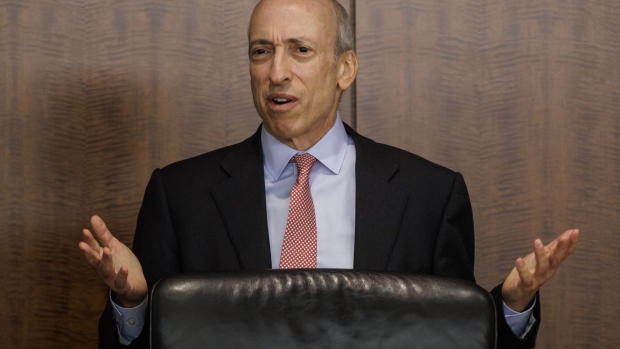Jan 11, 2024
Crypto Skeptic Gary Gensler Becomes Reluctant Backer of Bitcoin ETFs
, Bloomberg News

(Bloomberg) -- Securities and Exchange Commission Chair Gary Gensler is a well-known critic of the crypto industry, often warning investors that the asset class is rife with fraud.
But the top Wall Street regulator, who’s seen as crypto’s no. 1 enemy, made a rare capitulation when he became the determining vote in a split decision Wednesday to approve almost a dozen spot Bitcoin exchange-traded funds — a product that he and his predecessor had rejected more than 20 times.
His decision, which allowed companies including BlackRock Inc. and Fidelity to launch products Thursday, didn’t seem to be one made with much conviction. Gensler used a significant portion of his statement on the approvals to discuss crypto’s lack of compliance and to stress that the decision on the ETFs didn’t mean the SEC had given the entire industry its blessing.
“It should in no way signal the commission’s willingness to approve listing standards for crypto asset securities,” he said. “Nor does the approval signal anything about the commission’s views as to the status of other crypto assets under the federal securities laws or about the current state of non-compliance of certain crypto asset market participants with the federal securities laws.”
The SEC declined to comment beyond the Wednesday statement.
The lead-up to the SEC’s decision was marked by one headache after another. Late Tuesday, someone hacked the agency’s official account on the social media platform X to circulate a fake post claiming the regulator had approved the products a day early. Then on Wednesday, the approval order for the Bitcoin ETFs briefly appeared on an SEC webpage before being taken down and then re-posted several minutes later.
In the end, Gensler, a Democrat, reluctantly voted with the SEC’s two Republican commissioners to green-light the products. The other two Democrats on the commission voted against the Bitcoin ETFs.
Before Wednesday’s decision, the SEC had denied every application for an ETF directly tracking Bitcoin, despite approving products backed by Bitcoin futures in 2021. The regulator cited concerns that the underlying market was more susceptible to fraud and manipulation.
But the tides shifted after an August ruling in which a federal court sided with crypto asset manager Grayscale Investments. Grayscale had sued the SEC, arguing that its decision to deny the firm’s spot ETF was arbitrary and capricious because of the regulator’s prior approval of the Bitcoin futures products.
Gensler pointed to the Grayscale decision as a determining factor for approving the latest round of filings, saying circumstances changed after that ruling. However, he described the approval as applying to a very narrow class of investment products and said it doesn’t change how the SEC views the rest of the industry.
“Investors should remain cautious about the myriad risks associated with bitcoin and products whose value is tied to crypto,” he said in his statement.
Hands Tied
Gensler’s message arrived loud and clear.
There should be no doubts that the majority of the commission remains hostile to digital assets and that Gensler views Bitcoin as a speculative, volatile asset often used for illegal activities, said Howard Fischer, a partner at the law firm Moses Singer who previously worked as a senior trial attorney at the SEC.
“By stressing that the commission’s hands were essentially tied, I think he is in effect washing his hands if there is any collapse on the price” of Bitcoin, Fischer said.
Coy Garrison, a partner at the law firm Steptoe and former counsel to SEC Commissioner Hester Peirce, said the approval of Bitcoin ETFs doesn’t necessarily mean the agency will start allowing products tracking other cryptocurrencies.
“I really believe that the agency’s going to be reluctant to expand its analysis beyond Bitcoin,” Garrison said.
Read more: Ark’s Wood Says Gensler ‘Denigrated’ Crypto With His Statement
Ark Investment Management’s Cathie Wood was taken aback by Gensler’s statement.
“He just denigrated the whole crypto space,” Wood said in a Bloomberg Radio interview aired on X, the social network formerly known as Twitter. “I couldn’t believe it.”
Over the last year, the agency has brought one enforcement action after another against crypto companies — suing them for everything from outright fraud to registration violations. The industry has pushed back, claiming the agency is regulating by enforcement when it should be writing rules to clarify how securities laws apply to digital assets.
Despite the contentious relationship, Gensler may have just handed the sector one of its biggest wins to date — just one he won’t be celebrating.
--With assistance from Isabelle Lee and Carol Massar.
©2024 Bloomberg L.P.





